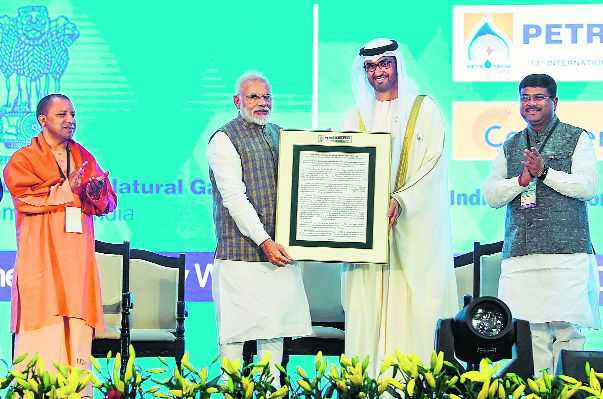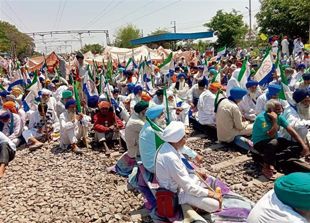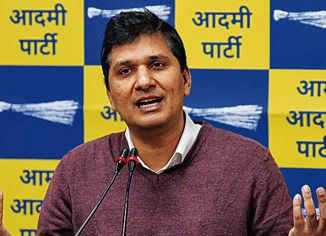
RECOGNITION: PM Narendra Modi honoured UAE’s Minister of State and ADNOC CEO Sultan Ahmed Al Jaber at Petrotech-2019 in Greater Noida on February 11.
KP Nayar
Strategic Analyst
For the first time since the global oil shock of 1973, India’s faltering steps towards energy security have given way to a holistic oil diplomacy that lays stress on personal chemistry, combining it with trade-offs and a strategic vision. At the centre of such diplomacy is Abu Dhabi, which has graduated in the past four years from a buyer-seller relationship in oil with India into an important guarantor of this country’s energy security.
Here is a poser. Which minister of any foreign country has visited New Delhi the most number of times in the past year? The natural temptation is to name a minister from Bangladesh, Bhutan or Mauritius, nations with which India’s engagement goes beyond foreign affairs and spills over into development support or cultural synthesis. Some people may name Myanmar or Afghanistan because of layers of bilateral security overlaps.
The correct answer is Sultan bin Ahmad Al Jaber, a member of the UAE Cabinet headed by Prime Minister Sheikh Mohammed bin Rashid Al Maktoum, who is also the ruler of Dubai. He is officially designated to be “responsible for economic, political, development and social files of the UAE, promoting the UAE’s strategic relations with a number of countries.” Such responsibility now includes India.
Some of Al Jaber’s whistle-stops in New Delhi or Mumbai have lasted no more than a few hours. Add to that, in the past year, Al Jaber has had about a dozen meetings in Abu Dhabi with members of the Narendra Modi government who now make frequent stops in the UAE as their bilateral engagement grows by leaps and bounds.
What has India gained so far from such hands-on, fast-paced, face-to-face diplomacy by Al Jaber, whose style has been to abjure the easier option of videoconferencing with his Indian counterparts or to do business by telephone? For starters, there is the Rs 3 lakh-crore Ratnagiri refinery and petrochemicals project, which has become the most visible showcase for tripartite investment by the UAE, Saudi Arabia and India.
But there are several, more enduring, long-range ventures with the UAE that guarantee India’s vital energy security. One such is an ongoing programme of filling up India’s strategic petroleum reserve with crude oil from the Abu Dhabi National Oil Company (ADNOC), of which Al Jaber is the CEO. The Indian Strategic Petroleum Reserves Ltd (ISPRL) has built three underground storage reserves which together guarantee critical oil supply for the country for 10 days in the event of war or global disruption in the movement of fuel.
Al Jaber and Dharmendra Pradhan, the Minister for Petroleum and Natural Gas, agreed last November to cooperate on expanding India’s strategic petroleum reserve to 22 days. The ISPRL is building two more underground storage reserves to facilitate this: one at Chandikhol in Odisha and another at Padur in Karnataka.
The oil-producing Gulf countries have always wanted to cooperate in similar ways with India, recognising as far back as the 1980s that India would emerge in the 21st century as the biggest or the second biggest importer of their primary natural resource, namely oil. In the aftermath of Saddam Hussein’s invasion of Kuwait, the emirate looked at India to build an overseas base for its oil industry comprising transportation, refining and storage for its petroleum products. The idea was that its core economic base should be free from vulnerabilities such as another foreign invasion or domestic tumult.
After PV Narasimha Rao’s visit to Teheran in 1993, Iran unfurled a charter of energy cooperation that envisaged not only oil supplies, but also downstream petrochemical industries and use by India of Iran’s geographic proximity to gas-rich Central Asia. Oman followed with a proposal to build a sub-sea pipeline to India and a refinery that would guarantee a big part of India’s energy needs by a country that is at its best in the region at making friends of all ideological or religious persuasions and influencing them.
But all these plans by the Gulf countries fell by the wayside because India’s petroleum bureaucracy considered it its mandate and holy mission to raise relevant, irrelevant and irrational objections to all such proposals at the implementation stage. As a reporter who covered all prime ministerial visits that generated such proposals and followed up on them in subsequent years, I was often witness to the sheer frustration of Gulf leaders and decision-makers due to the extreme negativity of Indian babudom to any overseas proposal to improve India’s energy security.
In February 2016, ADNOC and ISPRL agreed on establishing their strategic petroleum reserve in Karnataka. Almost a year passed in tardy negotiations with the Indian bureaucracy playing its old game. To speed up the agreement, a deadline was set. The deal would become final during the visit of Sheikh Mohammed bin Zayed Al Nahyan, the Crown Prince of Abu Dhabi, as chief guest during Republic Day 2017.
The audacity of the petroleum bureaucracy was such that even two days before Republic Day, it tried to delay the signing of a memorandum of understanding between ADNOC and the ISPRL. At this stage, Al Jaber stepped in, and working directly with Pradhan, made the deal possible. That the two men enjoy good chemistry has made subsequent energy cooperation between India and Abu Dhabi possible. Al Jaber is no novice: earlier, he handled the UAE’s development programme in Egypt, where the bureaucratic problems are similar to India’s.
By cutting through the red tape and going directly to the political leadership, Al Jaber succeeded where other countries failed for decades in tapping the potential of India’s energy market to mutual advantage. Much has been achieved in bilateral cooperation since then. But for India, the crown jewel is a 10 per cent oil concession in Abu Dhabi’s offshore Lower Zakum facility which Al Jaber successfully steered in February 2018 for a consortium of ONGC Videsh, Indian Oil Company and Bharat Petro Resources Ltd.
In recognition of the success of the first holistic effort in India’s oil diplomacy with the Gulf and for his numerous contributions to the global energy sector, PM Narendra Modi last week honoured Al Jaber with an ‘International Lifetime Achievement Award’.



























